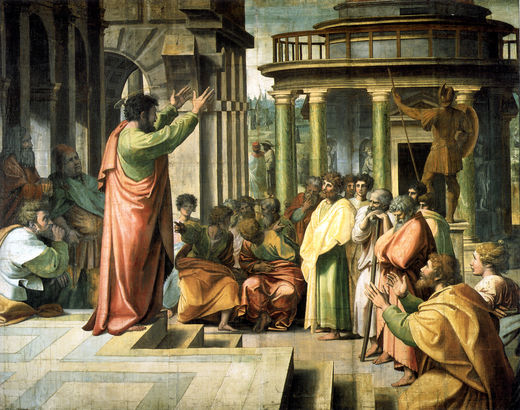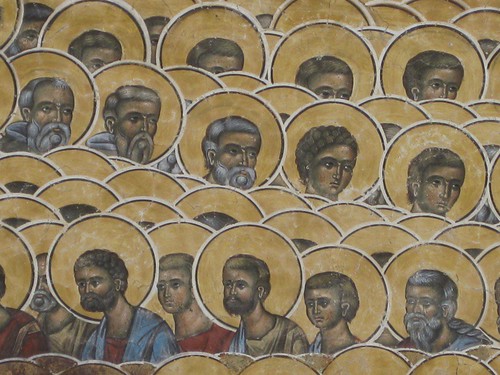
“I Knew a Saintâ€
Cn. Glenn E. Davis
Jay H. “Dr. Jay†Ferguson Memorial Service
June 3, 2012
To the church of God that is in Corinth, to those sanctified in Christ Jesus, called to be saints together with all those who in every place call upon the name of our Lord Jesus Christ, both their Lord and ours.
1 Cor. 1:2 ESV
“Saint,†is a loaded term. It is used different ways in different Christian faith traditions. Scripture teaches that we are all believers are saints in that we all have been made holy by Christ’s finished work on the Cross and trusted Christ’s righteousness to be our righteousness. However from the earliest days of the church, believers have especially recognized those men and women who looked to Christ in faith, trusted him in great trial, and saw God’s provision in dark times and distressing circumstances.
Biblically, the letter to the Hebrews 11 is a great Hall of Faith calling our attention to the men and women who made themselves available to God’s saving power. Historically, the Church in the Roman Catholic, Orthodox and Anglican traditions have recognized those men and women who have walked with Christ intimately and dearly: St. John Chrysostom of Constantinople and St. Gregory the Great of Rome, St. Monica of North Africa and St. Macrina of Asia Minor, and St. Patrick of Ireland and St. Julianna of Norwich.
Evangelicals avoid the naming of saints, but often recognize those whose faithfulness to God and the Gospel have been exemplary: David Brainerd, early missionary to the American Indians, Amy Carmichael, rescuer of young girls in India, and J. Hudson Taylor pioneer missionary to the deepest parts of China.
However there are everyday saints, people who will never have a biography written about them or a school named after them or a movement ascribed to their leadership. They are the everyday men and women of God who live the life of Christ before their families, at their jobs, and through their churches.
“Dr. Jay†was that kind of everyday saint.
Dr. Jay was an everyday saint not someone who was perfect, but a sinner who looked to Christ for life-transforming grace in his chronic weaknesses and on-going struggles. Dr. Jay was an everyday saint because did not pretend to be adequate in the spiritual life, but simply made himself available to the Holy Spirit’s gifts and power. Dr. Jay was needy, he knew he could not live the Christian life in his own power, he trusted Christ to live his life in and through him.
Dr. Jay looked constantly to Christ, he daily sought God’s love, comfort, peace, rest and assurance. He depended on Christ’s Cross and righteousness to be his approval with God. Jay looked to God’s grace to be his strength in the midst of his weaknesses.
To be holy does not mean being superior to others: the saint can be very weak, with many mistakes in his life. Holiness is this profound contact with God, becoming a friend of God: it is letting the Other [God] work . . . .
Joseph Cardinal Ratzinger (Pope Benedict XVI)
Dr. Jay was an everyday saint in the truest sense of the word: a man of God, persistent prayer warrior, God-honoring Bible teacher, genuine friend, spiritual mentor, selfless husband, godly father and doting grandfather. Jay sought God’s heart, listened to the Spirit’s voice, and trusted God’s grace to enable him to obey God’s call.
Dr. Jay was a true Barnabas, an extraordinary encourager of men and women.
[illustration: Saturday night encourager: “The Lord willing, I will see you tomorrow.â€]
Dr. Jay was a true Apostle John, a devoted lover of Christ, the heavenly bridegroom.
Dr. Jay was a true evangelist like deacon Philip, sharing the gospel at every opportunity.
Even in his greatest hour of sickness, Dr. Jay was ministering Christ, prophesying in the Spirit, and prayerfully interceding for his family, friends, and church.
[Illustration: Witnesses to doctors and nurses and prophesies to visitors in his greatest hour of suffering and need.]
Dr. Jay was a true family man like the Apostle Paul describes in the Letter to the Ephesians, he loved, served, and honored his wife, children, and grandchildren.
The saint is not one who tries hard to be good, but one who surrenders to [God’s] Goodness.
E. Stanley Jones, In ChristÂ
Yes, indeed. I knew a saint and you knew a saint. That man of God was Dr. Jay and he will be greatly missed by all.






